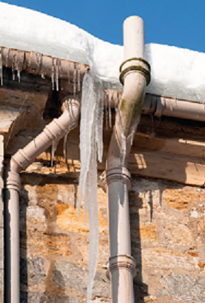Winter sewage backups can turn a wonderful holiday into a terrible and expensive memory (just after you splurge on presents). And that is the best case. Most times it will turn a cold, miserable day into a cold, miserable, smelly month. You probably do not need any more convincing that a sewage backup is one of the worst things to happen.
Here are some causes and tips for preventing it.
- Ice Buildup:
Your sanitary water inside the piping doesn’t flow continuously. There will be periods of stagnant water and when the temperature drops during a cold snap, this water can freeze. It might take a few days, or it might happen overnight depending on the depth of the buried pipe. Either way, your sewage won’t be able to flow freely in the right direction and will back up into your home. If the cold weather is a one-off event there’s not much you can do to prevent it. If you’re in an area prone to extreme weather, talk to a professional about heat tracing. - Extra Grease:
With the extra cooking that goes on during the holidays, you may end up dumping more grease and oil down the sink than you should. Coupled with cooler temperatures hardening it faster, you may find your kitchen sink backing up more than usual. Even worse, the grease buildup can be further down the pipes, causing backups throughout your plumbing. Be vigilant about what you put down in the sink and dispose of oil and grease in the garbage. - Collapsed Pipes:
Ice buildup inside the pipes is one problem. You also must worry about the weight of ice and snow outside your pipes causing it to collapse. If it’s buried at the right depth and your soil drains properly, you have a reduced risk of this happening. Replacing your older pipes with new, sturdier pipes further reduces the likelihood of this situation. Snow Melt isn’t restricted to spring. As long as the temperature goes above the freezing mark, a storm and sewage system can get overwhelmed by melting snow. This is less of an issue in areas with separate storms and sewage, but many towns still combine the two. Do your part to keep your yard clean from fall debris to give melting snow somewhere else to go besides your sewer system. - Iced Sewer Vent:
While an up vent doesn’t directly block the sanitary flow, it does prevent air from entering the system. This slows your entire system and can cause backups and sink overflows if you’re not careful. Avoid this situation with increased insulation around your vent pipe.
Give us a call at (740) 273-6356 and we can help reduce your risk of a sewage backup this winter. For a full list of our services please visit our website at www.emergencyplumbingservice.com. Have a Happy & Safe Winter!

